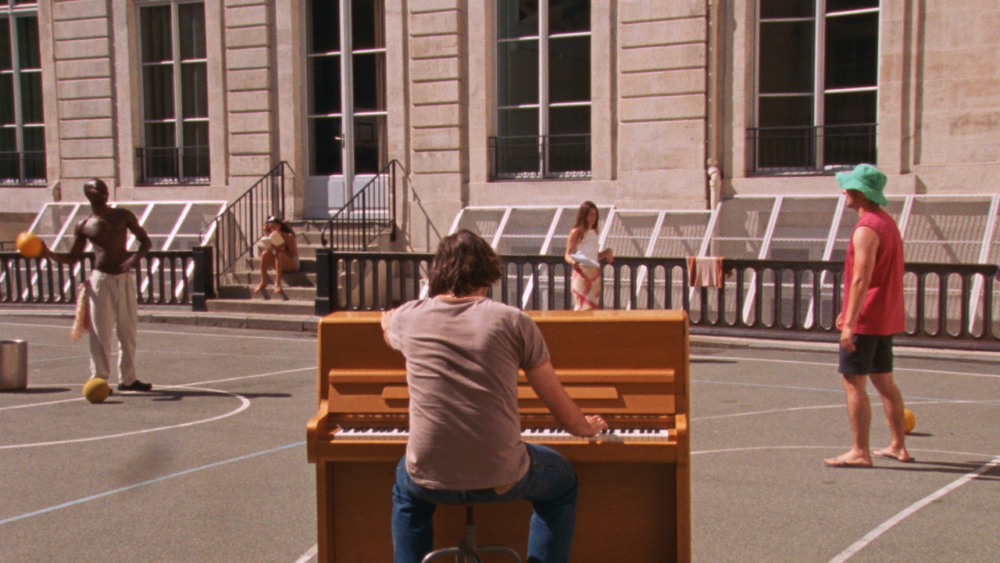“Why do we always need misfortune to reunite?” Gaspard (Andranic Manet) asks his twin sister Louise (Noée Abita) in a series of voiceovers. Referring to the siblings’ childhood friends who currently join Gaspard for a covert summer getaway, Louise reminds her brother that it’s just life, to which Gaspard reflects, “We should have done this earlier.”
With “Eternal Playground” (French: La récréation de juillet), writer-directors Pablo Cotten and Joseph Rozé evoke nostalgia and the crystallization of core childhood memories, the best of which are placed on a pedestal. More than the maudlin sentimentality, however, the film encapsulates people’s intrinsic desire for connection, lest they face their fears of finally growing up only to see life ultimately pass them by.
[More Tribeca Coverage: ‘Emergent City’: An (Oftentimes) Objective Take on Contemporary Urban Development]
Transforming an Entire School into a Time Capsule
“Eternal Playground” begins with a dialogue from the twins Gaspard and Louise. The film makes it clear right away that all the conversations are happening in Gaspard’s head, with Louise having recently died. The conversations revolve around the siblings recounting their memories of celebrating their birthday every July 14, which coincides with Bastille Day, and how their parents made them believe that the fireworks display during the day were actually for them.
Subsequent scenes show Gaspard as a passionate music teacher completing his first year at his former middle school. It’s the last day of school in July, and everyone — from the students to the faculty — is raring to go on break until September. For Gaspard, however, the approaching summer holiday holds a bittersweet significance. It marks the first birthday he will spend without his beloved twin sister, whose absence the film makes clear has left a big void in his heart.
So while everyone else hurriedly leaves the school, Gaspard stays hidden until the principal locks the building, leaving the Gaspard inside. We begin to realize that he intends to honor Louise’s final wish: gather their five former best friends at their deserted school and celebrate Louise’s life, while the remaining friends reconnect.
While initially hesitant, the friends — who have drifted apart over time — eventually agree to reunite. They take a leave from their adult lives and their responsibilities, spending the next few days in the school, behaving like kids once again as their memories come flooding back.

Re-contextualizing Old Friendships Resulting from a Devastating Loss
Somehow, “Eternal Playground” is the antithesis of the Beach Boys song ‘Wouldn’t It Be Nice’, in that the former’s characters behave like children in this temporary world they’ve created. Here, they bask in nostalgia, revisit their rose-tinted childhood memories, and forget the reality awaiting them outside the school. They spend their days playing games in the schoolyard, dancing in the empty classrooms, and reminiscing about their old teachers.
Even so, they also talk about their desires, regrets, unfulfilled potential, and ambitions with a childlike innocence. “Eternal Playground” makes it clear that Louise’s death has brought the friends together again, this time with a promise that no one would lose touch anymore.
However, a seemingly harmless white lie by one of the characters threatens to disrupt the harmony that everyone carefully reestablished, with Gaspard and Louise’s birthday fast approaching.
‘Eternal Playground’: Enough Heart to Offset Its Saccharine Predictability
What’s impressive with “Eternal Playground” is that this serves as the feature debut from writer-directors Rozé and Cotton. The filmmakers, shooting in 16mm to give the film a gorgeously nostalgic feel, focus on the reunion as a joyous celebration of life and a newfound, shared sense of belonging. Tara-Jay Bangalter’s camerawork deserves praise here, beautifully capturing scenes that evoke nostalgia to revisit one’s youth. And while its adherence to the by-the-numbers predictability found in most coming-of-age films of the same verve can feel too contrived at times; the film proudly wears its emotions on its sleeve.
Finally, much can be said with the film’s cast. Alassane Diong, Carla Audebaud, Alba-Gaïa Bellugi, Arcadi Radeff, Nina Zamzem, and Noée Abita all merit kudos for their performances; but Andranic Manet’s performance as Gaspard really takes the cake here. Manet imbues his character with a lack of maturity, unexpressed grief, and pent-up personal disappointments; so much that audiences couldn’t stay mad at Gaspard even if he behaves obnoxiously at certain points in the film.
“Eternal Playground” captures the intricate feelings of loss, companionship, and the bittersweet journey of growing up. There are moments that play it predictably safe, but fortunately nothing that takes away from its melancholic yet hopeful atmosphere. And when the final scene unfolds, we finally stop caring if Gaspard would still have a job next school year, with all the violations he has committed for the sake of honoring Louise’s final wish. Heck, we don’t even know if he’d be a free man by then.
But for what it’s worth, he doesn’t seem to care either. And for that, we’ll gladly go along for the ride.